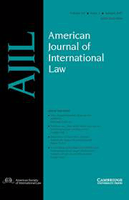
AMERICAN JOURNAL OF INTERNATIONAL LAW
Scope & Guideline
Pioneering Insights in International Law
Introduction
Aims and Scopes
- International Human Rights Law:
The journal consistently explores the intersection of international law and human rights, examining issues such as refugee rights, gender equality, and accountability for war crimes. - Global Governance and International Organizations:
AJIL analyzes the roles and functions of international organizations, particularly the United Nations, and how they shape global governance frameworks and legal standards. - International Economic Law:
The journal covers topics related to trade law, investment treaties, and economic sanctions, reflecting the evolving nature of economic relations among states and their legal implications. - Conflict and Security Law:
The journal discusses legal frameworks surrounding armed conflict, military operations, and state responsibility, providing insights into the legalities of warfare and peacekeeping. - Environmental Law and Sustainability:
AJIL highlights the importance of international environmental law, addressing issues such as climate change, sustainable development, and the role of international law in promoting environmental protection. - Transnational Legal Issues:
The journal examines legal phenomena that cross national borders, including issues related to migration, statelessness, and the impact of globalization on domestic legal systems.
Trending and Emerging
- Gender Equality and Legal Perspectives:
Recent publications emphasize gender equality from transnational legal perspectives, showcasing a growing recognition of the need for inclusive legal frameworks that address gender-based injustices. - Digital Law and Humanitarianism:
Emerging themes focus on digital humanitarianism and the legal implications of technology in international law, reflecting concerns over privacy, data security, and the role of technology in global governance. - Climate Change and Environmental Justice:
The journal increasingly addresses the legal challenges posed by climate change, emphasizing the intersection of international law with environmental justice and sustainable development. - Corporate Accountability in International Law:
There is a notable rise in discussions around corporate accountability, particularly regarding human rights and environmental standards, indicating a shift towards holding corporations responsible on a global scale. - Transnational Justice and Accountability Mechanisms:
Emerging themes include innovative approaches to transitional justice and accountability for atrocity crimes, reflecting a growing interest in how international law can facilitate justice in post-conflict societies.
Declining or Waning
- Traditional State Sovereignty:
There seems to be a diminishing emphasis on traditional notions of state sovereignty, as discussions increasingly center around global governance, transnationalism, and human rights. - Cold War-Era International Relations:
Papers focusing on the legal implications of Cold War dynamics are less frequent, indicating a shift towards contemporary issues that reflect current geopolitical realities. - Historical Legal Precedents:
The exploration of historical legal cases and their implications for modern law is becoming less common, with a greater focus now on current legal challenges and future directions. - Military Law and Traditional Warfare:
Themes centered on conventional military law are waning, as the journal shifts its focus to emerging security threats such as cyber warfare and non-state actors. - Regional Disputes and Bilateral Treaties:
The journal has seen a reduction in articles specifically addressing regional disputes and the intricacies of bilateral treaties, favoring broader discussions on multilateral frameworks.
Similar Journals
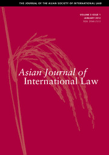
Asian Journal of International Law
Navigating the Complexities of Asian Legal FrameworksThe Asian Journal of International Law, published by Cambridge University Press, is a premier academic journal dedicated to advancing the discourse on international law across Asia and beyond. With its ISSN 2044-2513 and E-ISSN 2044-2521, the journal has carved a significant niche in the field, achieving a Scopus rank of #463 out of 1025 in the Social Sciences category, placing it in the 54th percentile. As of 2023, it holds a Q3 category in law, reflecting its growing influence and recognition within the academic community. The journal features peer-reviewed articles that critically engage with contemporary legal issues, promote scholarly debate, and provide insights into the legal frameworks affecting the Asia-Pacific region. With no open access options currently available, it caters primarily to academics, professionals, and students seeking in-depth knowledge and critical analysis. The Asian Journal of International Law aims to be at the forefront of international legal scholarship, fostering an understanding of the complex legal landscapes that shape our world.
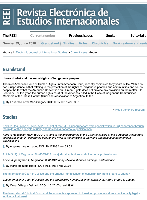
Revista Electronica de Estudios Internacionales
Championing Open Access to International ScholarshipRevista Electronica de Estudios Internacionales is a prominent academic journal dedicated to the exploration of international studies, published by the esteemed ASOC ESPANOLA PROFESORES DERECHO INT & RELACIONES INT-AEPDIRI. Based in Spain, this journal has embraced an Open Access model since its inception in 2000, allowing researchers, students, and professionals to freely access and disseminate significant findings in the field. With an ISSN of 1697-5197, the journal highlights critical issues surrounding international law and relations, maintaining a vital role in the ongoing discourse within the academic community. Currently categorized as Q4 in the Law field and ranked #755 out of 1025 within the Scopus database, the journal offers a platform for innovative thinking and scholarly contributions, which are particularly important in today's rapidly evolving global scenario. Explore the latest research and insights from 2019 to 2023 in this essential resource for those engaged in the study and practice of international relations.
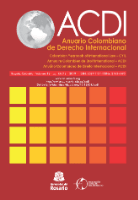
Anuario Colombiano de Derecho Internacional-ACDI
Advancing International Law through Open DialogueAnuario Colombiano de Derecho Internacional-ACDI, published by UNIV ROSARIO, EDITORIAL, is a pivotal open-access journal established in 2008, focusing on the field of international law. Situated in Colombia, this journal serves as a vital platform for scholars, practitioners, and students to disseminate and discuss pivotal legal issues that resonate within an increasingly globalized context. With an impact factor reflecting its relevance—ranking in the Q3 category of law and positioned at the 33rd percentile among legal journals in the Scopus ranking—ACDI is a commendable source for academic research. The journal operates under a rigorous peer-review process, ensuring high standards of scholarly communication. Its commitment to accessibility fosters a broader dialogue among legal professionals worldwide, making it an essential resource for advancing knowledge and discourse in international law.

International Organizations Law Review
Navigating the Complexities of International Organizations LawInternational Organizations Law Review is a distinguished academic journal published by BRILL, focusing on the interdisciplinary intersections of law, political science, and economics in the context of international organizations. With an ISSN of 1572-3739 and an E-ISSN of 1572-3747, this journal has been a key player in advancing scholarly dialogue since its inception in 2004, and it is set to continue its vital contribution until 2024. Though currently categorized in the Q4 quartile across various domains, including Economics and Law, it holds a respectable position within Scopus rankings, indicating its growing influence in the social sciences. Researchers and professionals looking for critical insights and the latest research in international law and organizational dynamics will find this journal invaluable. The International Organizations Law Review is committed to fostering a deeper understanding of the legal frameworks governing international interactions, making it an essential resource for students and academics alike.

Public and Private International Law Bulletin
Exploring the Nexus of Public and Private LawPublic and Private International Law Bulletin, published by ISTANBUL UNIVERSITY, serves as a pivotal platform for the dissemination of research and discussion surrounding the vital fields of international law. With an ISSN of 2651-5377 and an E-ISSN of 2667-4114, this journal has embraced the Open Access model since 2017, ensuring that scholars and practitioners globally can access cutting-edge research without barriers. The journal’s scope encompasses a wide array of topics including cross-border legal frameworks, comparative studies in international law, and the dynamics between public and private legal mechanisms. Nestled in the historical context of Istanbul, Turkey, the bulletin aims to foster critical dialogue among researchers, professionals, and students alike, contributing to the evolving landscape of international jurisprudence. As it continues to grow in prestige, it strives to engage with diverse perspectives and solutions, solidifying its importance within the global legal community.

Diritti Umani e Diritto Internazionale
Exploring the Intersection of Human Rights and International LawDiritti Umani e Diritto Internazionale is a distinguished journal that occupies a crucial role in the field of human rights and international law. Published by SOC ED IL MULINO, it serves as a reputable platform for scholars, practitioners, and students alike to explore and contribute to contemporary discussions surrounding human rights issues at a global scale. The journal aims to disseminate high-quality research and theoretical insights that address pressing legal challenges, thereby fostering a deeper understanding of human rights principles and their applications in various contexts. Though not currently an open-access publication, its rich content and rigorous peer-review process ensure that contributions meet the highest academic standards. With its ISSN 1971-7105 and E-ISSN 1972-5485, Diritti Umani e Diritto Internazionale stands as a vital resource for those committed to advancing knowledge in this essential area of study, ensuring that readers stay informed about the latest developments and debates in human rights law.

COLUMBIA JOURNAL OF TRANSNATIONAL LAW
Fostering Dialogue on International Legal Challenges.The COLUMBIA JOURNAL OF TRANSNATIONAL LAW, published by the COLUMBIA JOURNAL TRANSNATIONAL LAW ASSOCIATION, stands as a premier academic platform in the fields of Law, Political Science, and International Relations. Having maintained a commendable Q2 ranking in both law and political science categories for 2023, it represents a vital resource for scholars and practitioners alike in navigating the complexities of transnational legal issues from 1996 to 2024. Situated in the U.S. at the esteemed Columbia University School of Law, the journal not only meets the rigorous academic standards but also addresses pressing global challenges through interdisciplinary research. Although it does not currently offer open access options, its commitment to providing insightful analyses and fostering robust scholarly dialogue in a rapidly changing world remains paramount. With its inclusion in reputable databases like Scopus, the journal is poised to impact the academic landscape significantly, catering to both emerging and established voices in transnational law.

CORNELL INTERNATIONAL LAW JOURNAL
Fostering critical dialogue on pressing global issues.CORNELL INTERNATIONAL LAW JOURNAL, published by CORNELL LAW SCHOOL, is a premier academic journal dedicated to advancing scholarship in the fields of law, political science, and international relations. Established with a commitment to fostering critical dialogue, this journal provides a platform for innovative research and legal analysis on pressing global issues. With an ISSN of 0010-8812 and an E-ISSN of 1930-7977, CORNELL INTERNATIONAL LAW JOURNAL holds a respectable Q3 ranking in the 2023 categories of Law, and Political Science and International Relations, underscoring its relevance within the academic community. The journal is indexed in Scopus, achieving a rank of #416 in Law and #345 in Political Science, illustrating its significant impact and accessibility. By providing essential insights, this journal aims to serve not only academics but also practitioners and policymakers interested in the evolving landscape of international law and governance.

Journal of East Asia and International Law
Illuminating the Evolving Legal Landscapes of East AsiaThe Journal of East Asia and International Law, published by the YIJUN Institute of International Law, serves as a vital platform for scholarly discourse in the field of law, with a particular focus on the complexities of East Asian legal systems and their interactions within the global context. Established in 2011 and based in Seoul, South Korea, this journal has been pivotal in fostering research that examines legal issues impacting East Asia, making significant contributions to the understanding of international law in this dynamic region. With its ISSN 1976-9229, the journal provides a valuable resource for researchers, professionals, and students interested in the evolving legal landscapes of East Asia. Though currently categorized in the Q4 quartile for law in the Scopus rankings, its dedication to enhancing legal scholarship positions it as a relevant player among emerging international law journals, encouraging submissions that explore innovative legal approaches and analyses. As ongoing interdisciplinary discussions deepen, the Journal of East Asia and International Law aims to enrich the academic community's understanding of international legal frameworks within East Asian contexts.
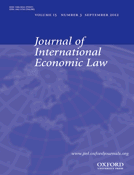
JOURNAL OF INTERNATIONAL ECONOMIC LAW
Shaping the Future of Economic Law Through Scholarly DialogueWelcome to the JOURNAL OF INTERNATIONAL ECONOMIC LAW, a prestigious academic journal published by Oxford University Press, dedicated to the interdisciplinary exploration of the intricate relationship between law and economics on a global scale. Since its inception in 1998, this quarterly journal has developed a reputation for excellence, currently holding a Q1 ranking in both Economics, Econometrics and Finance and Law categories. With an impressive Scopus ranking that places it in the 94th percentile for law and the 82nd percentile for economics, it serves as an essential resource for researchers, professionals, and students aiming to advance their understanding of international economic regulations and policies. Our goal is to foster scholarly dialogue and inform legal practices by publishing cutting-edge research, critical reviews, and comprehensive analyses relevant to contemporary issues in international economic law. Although the journal maintains subscription-only access, it remains a crucial platform for disseminating influential ideas and practices within the global academic community, encouraging rigorous debate and innovative thinking in this dynamic field.